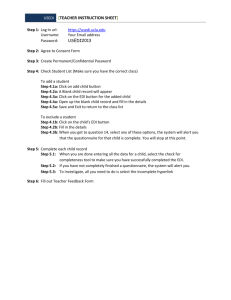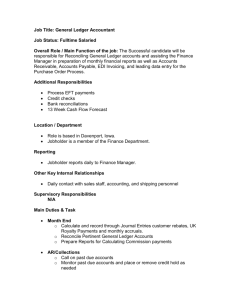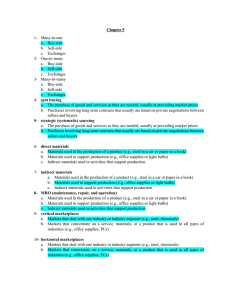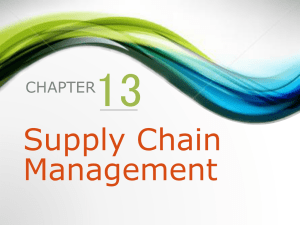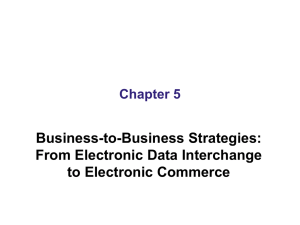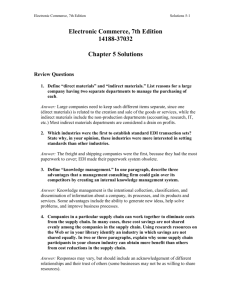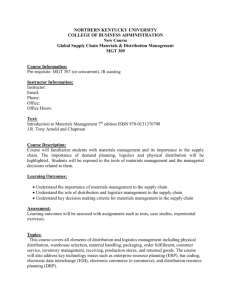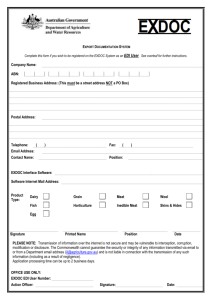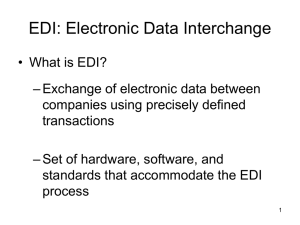Part1 - Faculty of Computer Science and Information Technology
advertisement
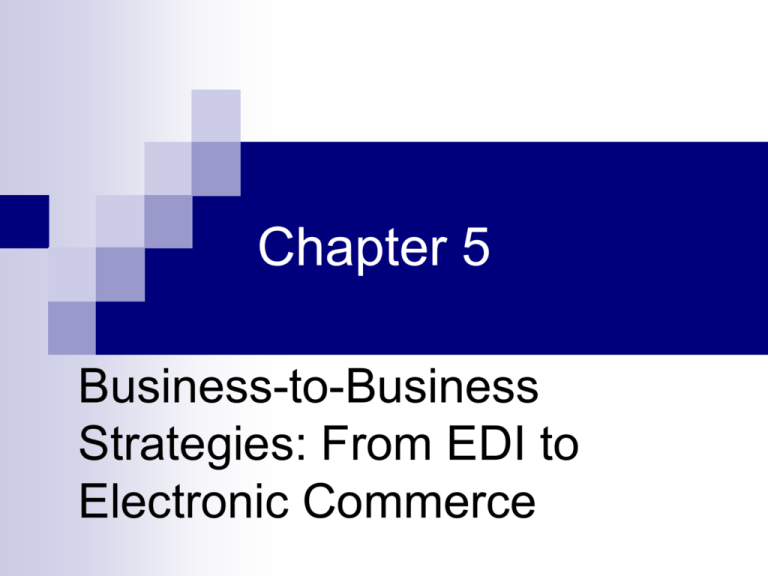
Chapter 5 Business-to-Business Strategies: From EDI to Electronic Commerce Purchasing, Logistics, and Support Activities Electronic commerce has the potential to reduce cost and improve the business processes of purchasing, logistics, and support activities. Purchasing Activities Purchasing activities include: Identifying vendors Evaluating vendors Selecting specific products Placing orders Resolving any issues that arise after receiving the ordered goods and services By using a Web site to process orders, the vendors in this market can save the cost of printing and shipping catalogs and the cost of handling telephone orders. Purchasing Activities Products that companies buy on a recurring basis = maintenance, repair, and operating (MRO) supplies. Businesses involves direct and indirect materials. Direct materials are those materials that become part of the finished product. Indirect materials are all other materials that the company purchases. Logistic Activities Objective of logistics = provide the right goods in the right quantities in the right place at the right time. Support Activities Support activities include: Finance and administration Human resources Technology development Network Model of Economic Organization The trend in purchasing, logistics, and support activities - move from hierarchical structures toward network structures – a feature of the Web Highly specialized firms can now exist and trade services very efficiently on the Web. The roots of Web technology for B2B transactions lie in electronic data interchange (EDI). Electronic Data Interchange EDI = computer-to-computer transfer of business information between two businesses that uses a standard format. Two businesses that are exchanging information = trading partners. Firms that exchange data in specific standard formats = EDI-compatible. Business information exchanged = transaction data (paper invoices, purchase orders, requests for quotations, bills of lading, and receiving reports); can include other information related to transactions, such as price quotes and order-status. Value-Added Networks EDI reduces paper flow streamlines the interchange of information among departments within a company and between companies. Direct Connection Between Trading Partners Direct connection EDI - each business in the network operates its own on-site EDI translator computer. These EDI translator computers are then connected directly to each other using modems and dial-up phone lines or dedicated leased lines. Direct Connection Between Trading Partners Indirect Connection Between Trading Partners Instead of connecting directly to each of its trading partners, a company might decide to use the services of a value-added network. Value-added network (VAN) = a company that provides the communications equipment, software, and skills needed to receive, store, and forward electronic messages that contain EDI transaction sets. Indirect Connection Between Trading Partners VAN Companies that provide VAN services in US = General Electric Information Services, GPAS, Harbinger Corp., IBM Global Services, etc. Cost is an issue to VAN - require an enrollment fee, a monthly maintenance fee, and a transaction fee. Supply Chain Management A company’s supply chain for a particular product or service includes all the activities undertaken to design, produce, promote, market, deliver, and support each individual component. Value Creation in the Supply Chain Supply chain management (SCM) = process of taking an active role in working with suppliers to improve products and processes . SCM - used to add value in the form of benefits to the ultimate consumer at the end of the supply chain. Can reduce production costs and increase the value of product or service to the ultimate customer. Using Internet Technology in the Supply Chain Clear communications and quick responses to those communications = key elements SCM. Technologies of the Internet and the Web can be very effective communication enhancers. Increasing Efficiency in the Supply Chain Many companies are using Internet and Web technologies to manage supply chains in ways that yield increasing efficiency throughout the chain. In 1997, production and scheduling errors costing Boeing over $1.5 billion - using EDI and Internet links, Boeing is working with suppliers so that they can provide the right part at the right time. Electronic Marketplaces and Portals Web - companies can use it to establish information hubs for each major industry - offer news, research reports, analyses of trends, and in-depth reports on companies in the industry AND offer marketplaces and auctions. Hubs - offer a doorway to the Internet for industry members and would be vertically integrated, these planned enterprises = vertical portals or vortals. Industry Marketplaces Ventro opened its first industry marketplace, Chemdex, in 1997 to trade bulk chemicals. Ventro also opened Promedix for specialty medical supplies, Amphire Solutions for food service, MarketMile for general business products and services, and a number of others. CheMatch.com competed directly with Ventro in the bulk chemicals market Industry Marketplaces
